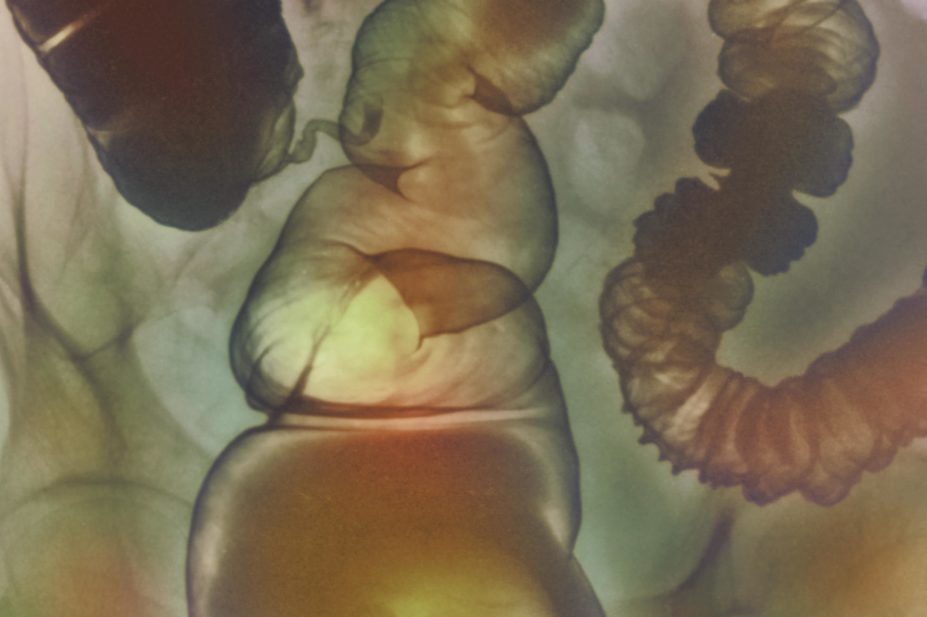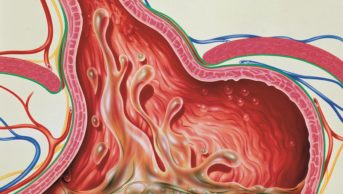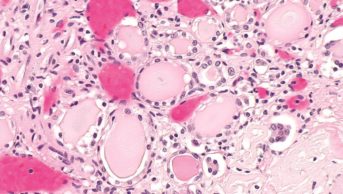
CNRI / Science Photo Library
The European Commission has granted a marketing authorisation to a first-in-class treatment for irritable bowel syndrome (IBS) called eluxadoline (Truberzi) for use in the EU.
The approval follows a positive opinion from the European Medicines Agency’s (EMA) Committee for Medicinal Products for Human Use (CHMP), which recommended the approval of eluxadoline for the treatment of adults with IBS with diarrhoea (IBS-D) in July 2016.
The marketing authorisation, which has been granted to Aptalis Pharma SAS, is due to be transferred to Allergan, which anticipates launching the product in 2017. The drug is expected to be available in Europe as 75mg and 100mg film-coated tablets by 2017. It has been available in the United States since December 2015 under the trade name Viberzi.
Eluxadoline, an oral agent with mixed opioid-receptor effects, acts locally to normalise the movement of food during digestion and has been shown to reverse hyperalgesic responses in models of acute visceral pain caused by colitis.
The CHMP’s decision to approve the drug for use in July 2016 follows the publication of results from two phase III trials in January 2016, which demonstrated how the drug can relieve abdominal pain and diarrhoea in patients who have IBS-D[1]
.
In the trials, researchers assigned 2,427 patients to eluzadoline (at a dose of 75mg or 100mg) or placebo twice daily for up to 52 weeks. For nearly a third of patients taking the 100mg dose, abdominal pain and stool consistency improved for at least 50% of days during the first 26 weeks of treatment. Patients given placebo saw the same improvements, but only for 19–20% of days in the first 26 weeks.
The CHMP said that the evidence showed that the rate of patients with improved symptoms was about 11.5 percentage points higher with the 100mg dose of eluzadoline than with placebo, whereas the difference was about 7 percentage points with the 75mg dose.
The most common side effects of eluxadoline are constipation, nausea, and abdominal pain/abdominal distension, each affecting 7–8% of patients. Serious adverse reactions, such as pancreatitis and sphincter of Oddi spasm, are rarer.
IBS is a common long-term condition of the digestive system, causing bouts of stomach cramps, bloating, diarrhoea and/or constipation. The symptoms vary between individuals and tend to come and go, lasting from a few days up to a few months at a time.
Symptoms appear often during times of stress or after eating certain foods, according to the NHS Choices website. It is believed to affect up to one in five people at some point in their life, and it usually first develops when an individual is between 20 and 30 years of age.
Commenting on the approval, Alexander Ford, professor of gastroenterology at the Leeds Institute of Biomedical and Clinical Sciences at Leeds Teaching Hospitals Trust, says: “There are no licensed treatments for IBS [with diarrhoea] in the UK at the moment, so this is a potentially useful drug, although I would add that the efficacy over and above placebo is modest, and it only seems to improve diarrhoea.”
“It had no real effect on abdominal pain,” adds Ford, who is also a medical adviser of the charity, the IBS Network.
References
[1] Lembo AJ, Lacy BE, Zuckerman MJ et al. Eluxadoline for irritable bowel syndrome with diarrhea. The New England Journal of Medicine 2016;37:242-253. doi: 10.1056/NEJMoa1505180


